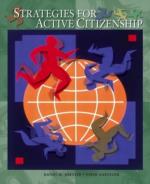|
This section contains 2,218 words (approx. 8 pages at 300 words per page) |

|
Why Do Contemporary Theorists Criticize Traditional Conceptions of Citizenship?
Summary: Citizenship it seems is a contested term, difficult to define with many contrasting, often contradictory elements. It does however, in theory at least, highlight a largely positive approach; an ideal from which we all can learn. Although the seemingly hypocritical nature modern citizenship seems to assimilate, I suppose it deserves to be viewed and understood in context.
"A man who shares in the administration of justice and in the holding of office" ...so wrote Aristotle in his authoritative work `The Politics'. This is perhaps the most appropriate place to start when attempting to assess `traditional' conceptions of citizenship and subsequent contemporary criticisms. This definition was the first real attempt to in some way `define' what a citizen, and by implication, what citizenship, actually was; to characterise the requirements one would need in order to qualify for it. The conditional requirements Aristotle placed upon the attainment of citizenship in Ancient Greece are viewed by many contemporary theorists to be based on exclusionist, elitist principals, defined more than who did not, rather than who did, qualify for Citizenship in the Athens City-State. My intention in this essay will therefore be to trace the progression of citizenship from ancient Greece through to modern times and in doing so...
|
This section contains 2,218 words (approx. 8 pages at 300 words per page) |

|


